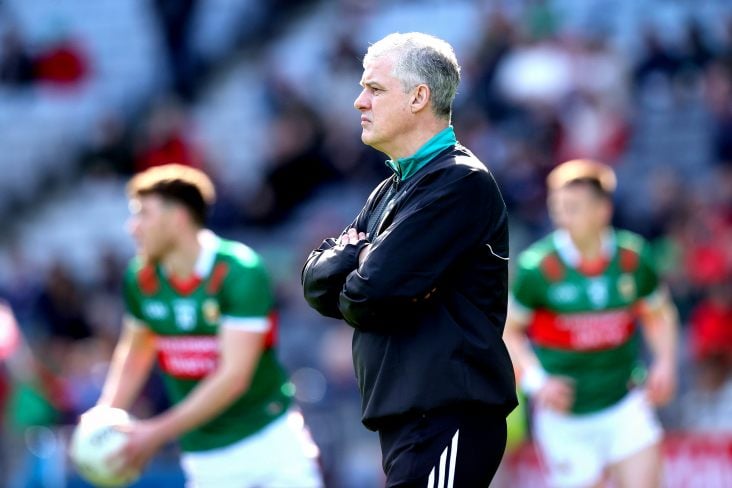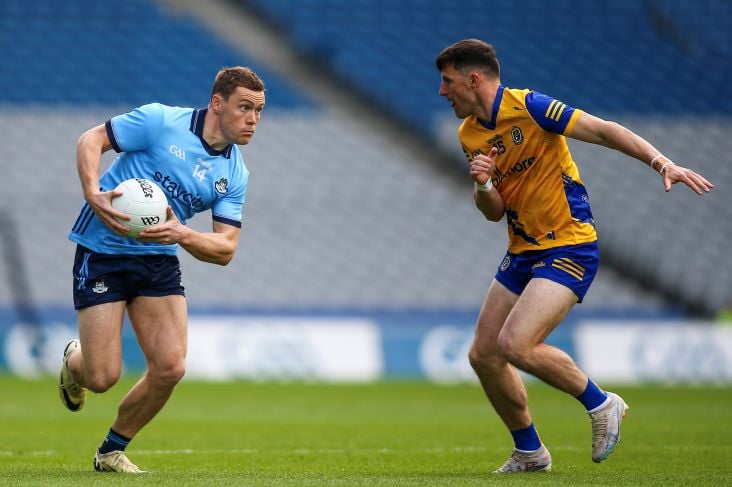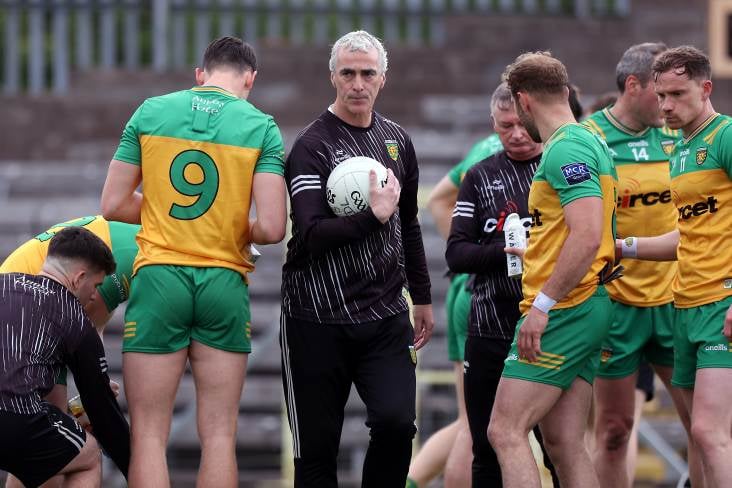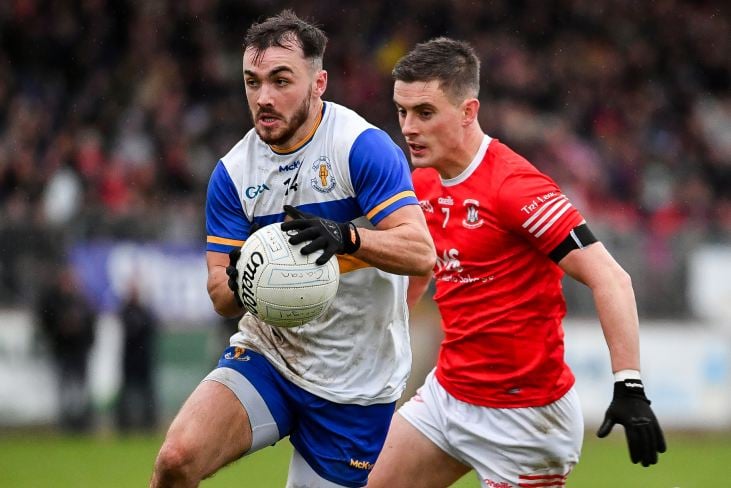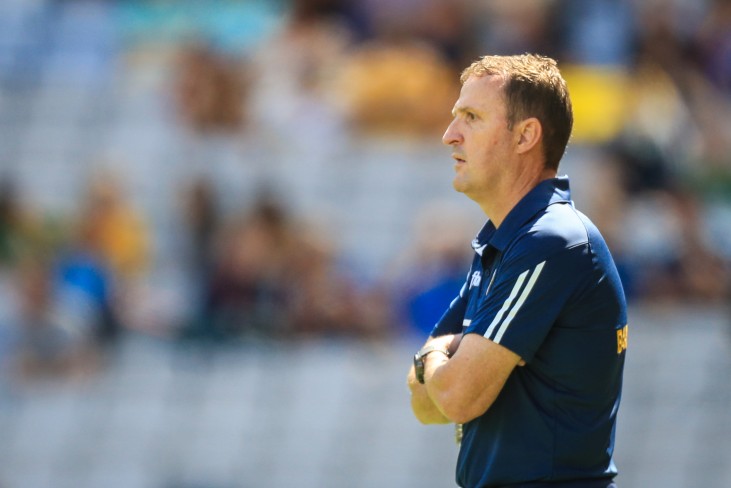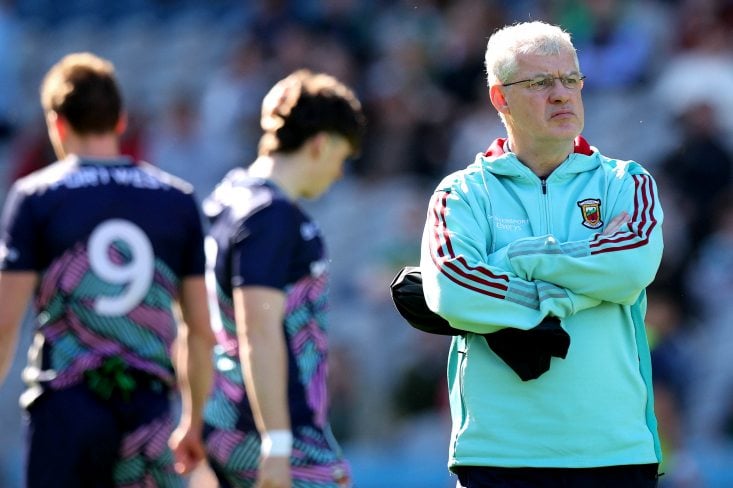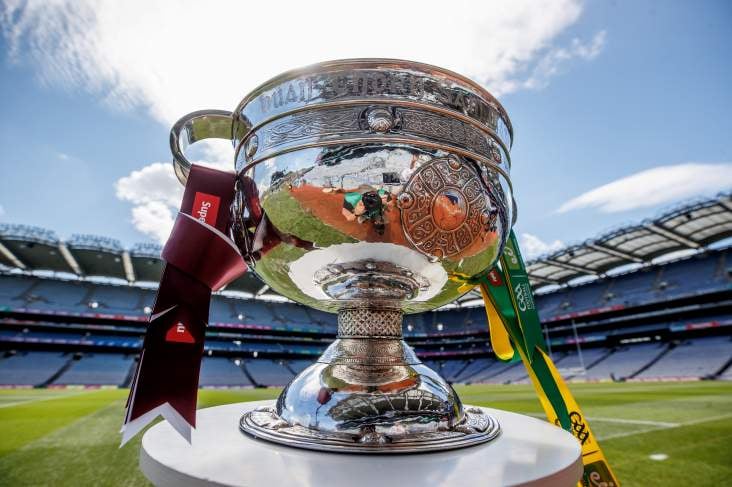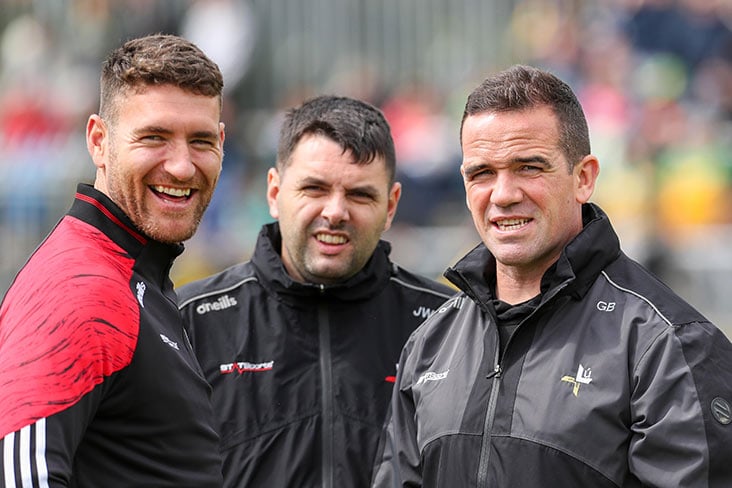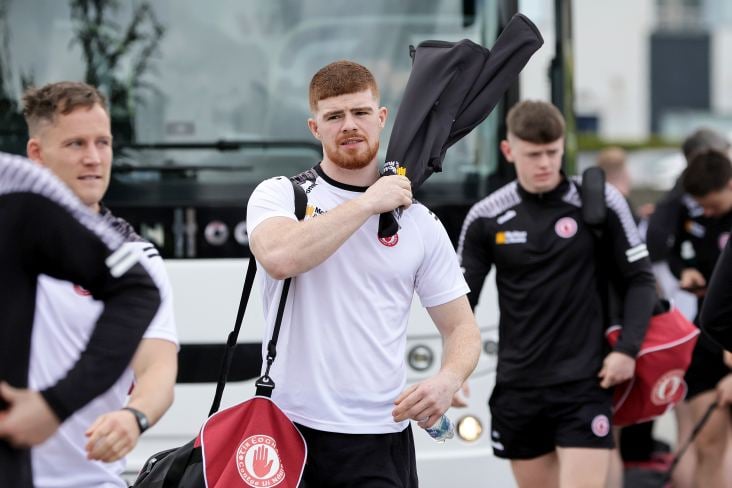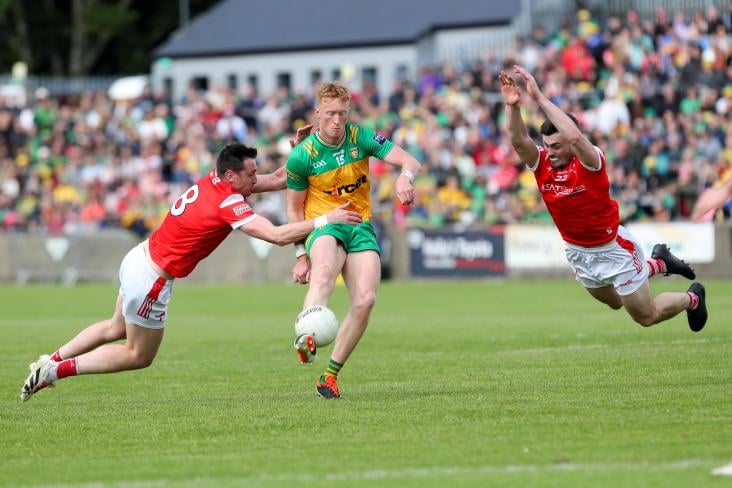The Cups That Cheered
January 22, 2013THAT CHEERED
A HISTORY OF THE
SIGERSON, FITZGIBBON
AND HIGHER EDUCATION GAELIC GAMES
Dónal McAnallen
Published in December 2012
price Eu29.99/£26.99
Jimmy McGuinness came to Tralee RTC as a mature student, won Sigerson Cup medals in 1998 and 1999, the latter as captain. He then went to Jordanstown where, in 2001, he became the first captain to lift the Sigerson Cup with two different colleges. A century after the donation of the trophies that gave rise to them, this book celebrates two of the longest-running national competitions in Gaelic games. The first history of the second oldest national competitions in Gaelic football and hurling, it captures the unique mixture of competitive spirit, camaraderie, famous figures, legendary stories, controversies and sense of joy and student mirth associated with the premier intercollegiate contests. The main focus is on the Sigerson Cup and Fitzgibbon Cup competitions, from their inception in 1911 and 1912 respectively to the present day with stories of epic games, personalities, antics and controversies. But coverage is also given to the origins and development of Gaelic games in higher education colleges prior to 1911 and the involvement of colleges in other Gaelic games competitions after 1911. The expansion of higher education Gaelic games since the late 1960s and new competitions is outlined, and the development of Gaelic games in universities and colleges outside of Ireland in more recent times. The narrative, complete with a wealth of fresh research, unpublished documents and images, describes not only the competitions and games but also the famous (or infamous) social side of activities, and the administrative developments and controversies that have been ever-present. This is a book with absorbing insights into the world of third-level Gaelic games since they began in pre-independence Ireland.
Dónal McAnallen is a history graduate of Queen's University Belfast, and the National University of Ireland Galway. In both he played Gaelic football, was involved in organising Sigerson Cup tournaments, and he has been national treasurer and secretary of Comhairle Ardoideachais, the GAA's Higher Education Council. Throughout he remained active with his club, An Eaglais, Co. Tyrone. He has worked at the Cardinal Ó Fiaich Library & Archive, Armagh, has been widely published, and he co-edited The Evolution of the GAA (2009).
978-1-84889-160-9 • Hardback • 234 x 156 mm • 592 pp • Colour/b&w photos
The Who, What, Where, When & Why of the Origins of 'The Cups that Cheered'
The Sigerson Cup
Presented by Dr George Sigerson, veteran professor of zoology at UCD, polymath and an eminent figure in Irish society at that time (as recognised by his appointment to chair the opening session of Seanad Éireann in 1922), in 1911, following overtures from the secretary of UCD GFC, J. J. McElligott (later secretary of the Department of Finance).
Although Sigerson himself was scarcely associated with Gaelic games, he was a nationalist and a champion of traditional Irish culture. By making the donation he became the first man to present a perpetual trophy for a national Gaelic games competition.
The cup was a solid silver trophy, in the shape of a mether (a traditional drinking vessel), with handles representing each of the four provinces.
The cup was presented as the prize for the newly inaugurated intercollegiate Gaelic football championship, with a view to stimulating closer interaction between the three constituent colleges of the National University of Ireland, at UCD, UCC and UCG. UCC won the first competition. Sigerson made the formal presentation at a post-tournament dinner at the Gresham Hotel, Dublin, in May 1911.
With the advent of Queen's, Belfast, to the competition in the 1930s, Trinity in the 1960s, Maynooth in the 1970s, and a raft of higher education institutions since, the field of contestants expanded dramatically, to reach as many as twenty in the 1990s.
The Fitzgibbon Cup
Donated in 1912 by Dr Edwin Fitzgibbon, a Capuchin priest and professor of philosophy at UCC, who had a keen interest in hurling. He presented the cup as a hurling equivalent of the Sigerson Cup, for a competition between the NUI colleges.
The cup was finished in February 1912, the date inscribed on the cup. It was and remains one of the grandest trophies in Gaelic games, both in size and in respect of its Celtic tracing designs. The cup cost Dr Edwin approximately £80 of his salary, and was put on display in the window of William Egan and Sons silversmiths before the first tournament. UCD won the inaugural tournament in Dublin.
Dr Edwin remained an active official of the UCC Hurling Club for many years, and attended many of the tournaments up to the 1930s.
The Sigerson Cup and Fitzgibbon Cup were the longest-serving national Gaelic games trophies in circulation, until they were replaced approximately ninety years later. Both cups endured numerous scrapes and mishaps over the course of a century. The base of the Fitzgibbon Cup went missing in 1970 and was not recovered until 1977, while the lid went missing in 1973 and was never found or replaced. The second Sigerson Cup went missing on the night of its presentation in 2001, and reappeared almost a year later on the doorstep of UUJ goalkeeper John Devine.
Interesting Stories
Physicality / The 1954 Fitzgibbon Cup tournament:
The competitions had a tradition for rigorous training, exhausting matches on consecutive days, and overt physicality. Until the 1960s it was an unwritten rule that no one could be sent off in the Sigerson Cup competition, and only a handful were dismissed in Fitzgibbon Cup games.
In 1954 the Fitzgibbon Cup competition was somewhat hijacked by Galway hurling supporters who wanted to exact revenge for the injury inflicted on their player Mickey Burke in the previous year's All-Ireland final. Many of the UCC players ended up in hospital after their game with UCG (in which the mysterious 'M. Burke' was reported as scoring three goals), and the UCD men were similarly manhandled in the final; this retributive physicality, and the use of illegal players, led to UCG's disqualification.
Revelry and raucousness
The competitions had a longstanding reputation for social events and often wild celebrations among players and supporters. Late-night functions (even before games) and filling the cups with alcohol were traditions from the early years, and the tournament dances and dinners were much-anticipated occasions. Sometimes the celebrations spilled over with unfortunate results, not least when a £25 bill for one night's drinking nearly led to the expulsion of some UCC GFC officials in 1943; seven UCD hurlers were detained in prison overnight in Belfast, and charged at court the next morning, after damaging war-memorial wreaths at Queen's following the 1958 Fitzgibbon Cup tournament; banquets in subsequent decades became gradually more outrageous, leading to the abandonment of some of the events, the most infamous instance being the food fight which brought a premature end to the 1986 Sigerson Cup dinner in Cork (which made national headlines and spelt an end to such functions for good); and in 1990 thousands of pounds' worth of destruction was wreaked on the Dublin University Boat Club (as described vividly by Joe Brolly in chapter 10).
Eligibility controversies:
There are numerous cases outlined of players playing who were not students at all, and objections and disputes over the eligibility of players to the present day. The expulsion of UCD from the 1971 Sigerson Cup weekend was already relatively well known, but the book reveals that the Fitzgibbon Cup was also withheld from UCD in 1933, UCC in 1940 and UCG in 1954. UCC players claimed that a stranger went into their dressing room in the 1927 tournament at Terenure but then appeared for UCD on the field several minutes later. The popular story, which has been borrowed and recited ad nauseam in recent decades to the extent that the teller recalled someone declaring in a match that his course of study was 'sums' , was already an old joke by the early 1930s. In recent years the picture has been complicated further by the introduction of financial incentives through player scholarships and aggressive recruitment of upcoming players. Some of the recent controversies are still quite sensitive manners.
Revolutionary figures
The early UCD and UCC teams contained several players who played prominent parts in the 1916 Easter Rising and the War of Independence, such as Frank Burke, Éamon Bulfin (later Irish ambassador to Argentina), Andrew Cooney, Con Lucey, Eugene Callanan and Jim Hurley. An iconic photograph in chapter 3 shows Con Lucey being carried shoulder-high with the Fitzgibbon Cup on the Mardyke pitch in 1918, with Terence MacSwiney, the Lord Mayor of Cork who died on hunger strike in 1920, visible in the background.
Several of the early players also joined the British imperial service, army medical corps and Crown forces. The UCG captain in the first Sigerson Cup competition, Jack Sheehy, became a Companion in the Indian Civil Service, was knighted in 1943, and was an official in the administration of post-war Germany, but was shot dead on his doorstep by burglars in 1949.
The book also reveals that hurling was played at Trinity College over a much longer period than previously realised, and among the players were many men of radically different views, several of them Protestants. They included Bob Hilliard from Kerry, the later Church of Ireland cleric who died in the International Brigade during the Spanish Civil War; J. G. Macmanaway from Monaghan, later a Church of Ireland cleric who sat as Unionist MP for West Belfast; and Brian Maginess from Down, a future Unionist MP and 1950s Minister for Home Affairs in the Northern Ireland government.
Rivalry between sports and early opposition to Gaelic games in universities
The book reveals the previously undocumented fact that a Gaelic football club was formed at Queen's College Cork in the late 1880s, but was refused clearance by the college authorities; the secretary of the club alleged discrimination, citing among other things a perception that the club members were political, even 'Fenian Dynamitors and Revolutionists'.
Queen's University Gaelic Football and Hurling Club was refused permission to affiliate to the students' representative council in the early 1920s on the basis that it played on Sundays; and Trinity College Hurling Club was also opposed by some elements within the university around the same time.
Amusing aspects and episodes:
1. Frank Sheehy got the crucial score at the end of a Sigerson Cup match in 1929, in horrendous weather conditions, while wearing wellies and carrying an umbrella.
2. The original participant teams had their distinctive war cries, consisting of gibberish, which they chanted before games; and UCG footballers brought along a goat as a mascot on several occasions.
3. UCC hurlers pioneered the wearing of helmets in the sport in Fitzgibbon Cup matches in the late 1960s. Before they adopted the ice-hockey model helmets that became standard for years to come, Micheál Óg Murphy came on as a substitute wearing a motorcycle helmet in the 1968 final, and scored a goal!
4. The referee of the 1971 Fitzgibbon Cup semi-final played twenty minutes more extra time than he was supposed to and only stopped play when the Angelus bell sounded nearby.
5. At the 1971 Sigerson Cup tournament in Galway, the UCC players who lost the Saturday semi-final, learned that they were reinstated to the final that afternoon (following UCD's disqualification), while drowning their sorrows at the pub.
6. Benny Gaughran, whose disputed eligibility led to UCD's disqualification in 1971, and who appears on the front cover of the book, operated his legal practice for many years from no. 3 Clare Street, Dublin, without realising that it was the former residence and medical practice of Dr George Sigerson himself.
The spread of Gaelic games to colleges outside Ireland
The book reveals that Gaelic games have been played at universities and higher education colleges outside Ireland for far longer and much further afield than previously appreciated. The playing of football and hurling at various institutions in Great Britain and the Irish College in the Paris since the 1920s is documented, as is the emergence of Cambridge and Oxford university teams in the 1960s, with Gearóid Ó Tuathaigh - later professor of history at UCG - among the Cambridge players. The rapid expansion of Gaelic games in British universities since the 1990s, and football in Breton universities and hurling in American universities since the 2000s, has led to many people who have no Irish roots taking up the sports.
People of interest
Frank Burke (UCD & Kildare/Dublin) holds the record of winning the most intervarsity honours, his nine victories comprising five in the Sigerson Cup and four in the Fitzgibbon Cup; he was interned for his part in the 1916 Rising, and became the principal of St Enda's College after the execution of Patrick Pearse.
Henry Kenny (UCG & Mayo) was a six-time medallist with UCG, 1936-41, and father of Taoiseach Enda Kenny
Mick Raftery (UCG & Mayo/Galway) retains the record as an eight-time Sigerson Cup winner, 1933-41.
Seán O'Neill (QUB & Down) was a forward star of Queen's first two Sigerson Cup triumphs, in 1958/59 and 1964/65, who also won three All-Ireland medals with Down in the 1960s, and managed Queen's to Sigerson Cup success in 1982.
Senator Martin McAleese (QUB & Antrim) scored two points in Queen's Sigerson Cup victory of 1971, after UCD was disqualified; and was supported at matches by his future wife, Mary, Irish president.
Moss Keane (UCC & Kerry) won Sigerson Cup medals with UCC in the late 1960s and early 1970s, shared a flat with Martin McAleese in Dublin, and went on to play for the Ireland rugby team.
Anthony 'Larry' Finnerty (UCG/UCD & Mayo) won three Sigerson Cup medals with UCG between 1981 and 1984, and came back to win a fourth with UCD in 1996.
Joe Brolly (TCD & Derry) was a star forward on the best Trinity football team ever, which was very unfortunate not to reach a Sigerson Cup final in the late 1980s and early 1990s; some memorable recollections of events in that period from the barrister and Sunday Game analyst appear in chapter 10.
Jimmy McGuinness (ITT/UUJ & Donegal) came to Tralee RTC in the late 1990s as a mature student, won two Sigerson Cup medals in 1998 and 1999, the latter as captain; and then went to Jordanstown where, in 2001, he became the first captain to lift the Sigerson Cup with two different colleges. He is now best known as the All-Ireland SFC-winning manager with Donegal and recently appointed performance consultant at Glasgow Celtic FC.
Dr Tommy Daly (UCD & Clare/Dublin), the legendary hurling goalkeeper who achieved a record six Fitzgibbon Cup victories for UCD between 1915 and 1927, twice as captain. He died tragically in 1936.
Pat Hehir (UCG & Galway) played for fifteen successive years, 1935-49, thus becoming the longest-serving intervarsity player, and won four Fitzgibbon Cup medals in the process.
The 1977 UCG team - rather than one player - contained three future All-Ireland SHC-winning captains (Joe Connolly, Galway; Pat Fleury, Offaly; and Conor Hayes, Galway), and All-Ireland-winning manager (Cyril Farrell) and a future GAA president (Joe McDonagh).
Nicky English (UCC & Tipperary) won five Fitzgibbon Cup medals in successive years, 1981-85, after being reprimanded by the team manager, Fr Michael O'Brien, for having long hair. Known as a prolific forward with Tipperary, he also switched to play in defence when UCC played against the wind.
Henry Shefflin (Kilkenny & WIT), arguably the most successful hurler of all time, was a sharpshooting WIT forward from 1998 to 2002.
Joe Canning (LIT & Galway) was the most prolific scorer in the history of either competition and attracted many spectators just to see him play for LIT. It is said that some students gravitated to the institute just to play alongside him.
Many politicians, ministers and TDs, including:
* Jack Lynch (UCC hurling, 1940s)
* Hugh Gibbons (UCG football, 1930s)
* Seán Flanagan (UCD football, 1940s)
* Dick Spring (TCD football, 1960s)
* Frank Fahey (UCG hurling, 1970s)
* Numerous GAA presidents, college presidents, eminent medics, legal eagles and public servants also.
Top 5 Games
Sigerson Cup
* 1958/59 final & replay - on both occasions came back from deficits of ten points, and went on to win the cup for the first time in the replay at Ballybay.
* 1971/72 semi-final, UCD v. UCC - in which Brendan Lynch (Kerry) scored an incredible goal from a free-kick in the last action of the game, to pinch a shock victory for UCC (by 3-7 to 0-15) at O'Toole Park, Dublin.
* 1976/77 final and replay, UCG v. UCC - in which UCG looked certain for victory before a huge crowd at Pearse Stadium, but a defensive lapse allowed UCD in for a late equalising goal; UCD refused to play extra-time.
* 1997/98 final - in which a 4,000-strong home following at Austin Stack Park watched IT Tralee slug out an absorbing contest with UUJ, until Jimmy McGuinness - who was playing on with a hand injury which left his bone exposed - popped up to score two late winning points. UUJ went back down the field but shot a goal effort very narrowly wide.
* 2005/06 quarter-final, UUJ v IT Sligo - which went to extra-time at Ballinode, and then became the first and only full Gaelic game of national stature to be settled by penalty-kicks.
Fitzgibbon Cup
* 1952/53 final - the first Gaelic games match in Ireland to be shown on television, being recorded by the new BBC Belfast service, and the first and only one won by Queen's - indeed, the only top-level national hurling title won by an Ulster side until the 1980s, albeit won with some outside assistance.
* 1992/93 final UCD v UCC - a thrilling match at Waterford, won after extra time by unfancied UCD, beating UCC by 2-21 to 4-14. Substitute Tom O'Connell (Kerry) scored an incredible volley goal from 35 yards out.
* 2007/08 final, WIT v LIT - the highest-scoring game in the competition's history, won by WIT, 1-29 to 1-24, after double extra time. Joe Canning scored an incredible 1-16 for LIT, including three from sideline cuts.
* 2009/10 semi-finals and final - in the semi-finals, NUIG beat LIT by 1-24 to 1-23 after extra time; and in the final at Pearse Stadium, NUIG pipped WIT by 1-17 to 1-16 after extra time, to win back the cup after a thirty-year gap.
* 2011/12 final - the first-ever all-Cork final, suitably held at the newly refurbished Mardyke in the centenary year. The game ebbed and flowed before a packed crowd despite the rain, until substitute Seamus Corry shot a late winner for UCC deep into extra-time, to beat CIT by 2-15 to 2-14. It was a fifth success as a coach, to match his five Fitzgibbon Cup triumphs as a player, for the late Paul O'Connor.
For further information, photographs, images or interviews with the author please contact:
Gillian Hennessy: Tel: 021-4347717 / e-mail: [email protected]
Con Collins: Mob: 087-2513922 / e-mail: [email protected] Tweet
